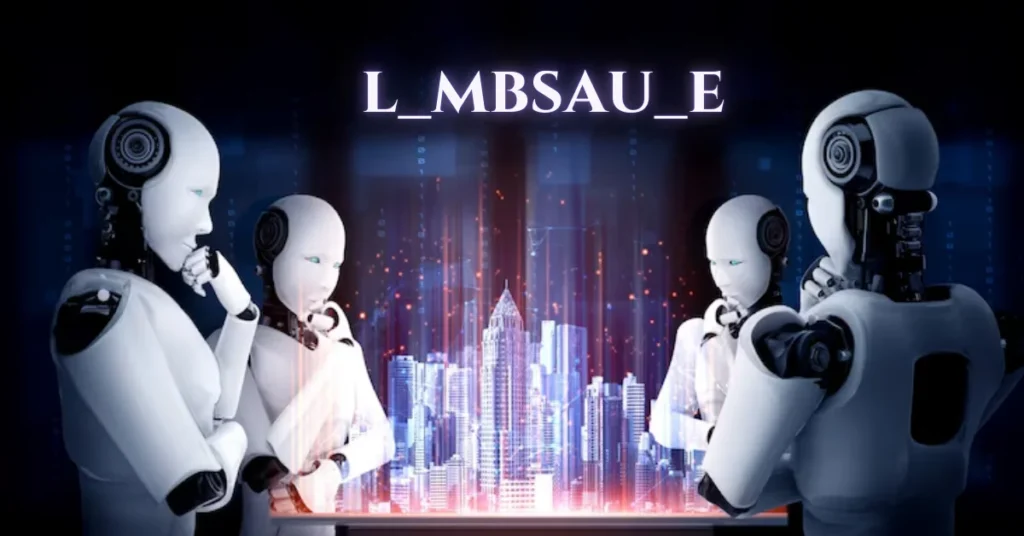Introduction to l_mbsau_e
Welcome to the exciting world of l_mbsau_e, a groundbreaking concept that’s set to redefine how we think about artificial intelligence. As technology advances at an unprecedented pace, we’re witnessing shifts that can shape industries and transform lives. Modular AI represents one such advancement—an innovative framework that allows for flexibility and customizability in AI applications.
Imagine a landscape where artificial intelligence is no longer just a monolithic entity but instead consists of modular components that can be tailored to specific tasks or problems. This approach not only enhances efficiency but also opens doors to endless possibilities across various sectors. The future is here, and it’s time to explore how l_mbsau_e could be your gateway to the next tech breakthrough!
Understanding Modular AI: What is it and how does it work?
Modular AI represents a shift in artificial intelligence design. Instead of a monolithic approach, it breaks down systems into smaller, manageable components. Each module specializes in specific tasks or functions.
This architecture allows for flexibility and scalability. Developers can easily swap out or upgrade individual modules without overhauling the entire system. It’s similar to building with Lego blocks; you can create diverse structures based on your needs.
Modules communicate seamlessly through defined interfaces. This interaction fosters collaboration between various AI capabilities, enhancing overall performance.
By leveraging common standards, modular AI promotes innovation across different sectors. Teams can combine specialized solutions to address complex challenges more effectively than traditional methods allow.
As technology evolves, understanding how these modules interact will be key to unlocking their full potential and driving advancements in various fields.
The Advantages of Modular AI Over Traditional AI
Modular AI offers remarkable flexibility compared to traditional systems. Each module can be developed, tested, and improved independently. This allows for quicker iterations and more efficient updates.
Customization is another key advantage. Businesses can tailor specific modules to meet their unique needs without overhauling the entire system. This adaptability leads to enhanced performance in targeted applications.
Scalability sets modular systems apart as well. Organizations can add or remove modules based on demand, ensuring resources are used efficiently. This is crucial in rapidly changing markets where agility matters most.
Collaboration becomes easier with a modular approach. Different teams can work simultaneously on various components, speeding up development timelines while promoting innovation across departments.
Applications of Modular AI in Various Industries
Modular AI has found a diverse range of applications across various industries. In healthcare, it enhances diagnostics by integrating different models for analyzing patient data, leading to more accurate outcomes.
In finance, Modular AI streamlines fraud detection systems. It allows institutions to adapt their algorithms quickly in response to new threats, making transactions safer and more secure.
The manufacturing sector also benefits significantly. Here, modular solutions facilitate predictive maintenance by combining sensors with analytical tools. This approach minimizes downtime and optimizes productivity.
Retail is not left behind either. Personalized shopping experiences are crafted using modular frameworks that analyze customer behavior patterns and preferences effectively.
Even agriculture utilizes Modular AI for precision farming techniques. By processing multiple data sources—from weather patterns to soil conditions—farmers can make informed decisions that increase crop yields while reducing waste.
ALSO READ: Juvgwg: A Deep Dive Into Its Origins, Meaning, and Impact
Challenges and Limitations of Modular AI
Modular AI, while promising, faces several challenges that can hinder its adoption. One significant limitation is the integration complexity. Different modules often have varying standards and protocols, making it difficult to ensure seamless communication.
Scalability presents another hurdle. As organizations expand their use of Modular AI systems, managing multiple components can become overwhelming. This may lead to inefficiencies or increased maintenance costs.
Data privacy remains a pressing concern as well. With various modules accessing sensitive information, ensuring compliance with regulations like GDPR becomes challenging.
Moreover, there’s the risk of dependency on specific vendors for module updates or support. Organizations might find themselves locked into ecosystems that stifle innovation due to lack of flexibility in switching providers.
The need for specialized knowledge cannot be overlooked. Teams must possess a nuanced understanding of both modular design and artificial intelligence principles to leverage these systems effectively.
The Future of Modular AI: Potential for Technological Breakthroughs
The future of modular AI is rife with opportunities. As technology advances, the ability to create specialized modules could lead to unprecedented innovations.
Imagine a world where AI systems seamlessly adapt and evolve based on specific tasks. This flexibility can drive breakthroughs in automation, healthcare, and more. Each module can learn independently but contribute to a larger ecosystem.
Moreover, collaboration between various industries will foster unique applications. Modular AI could revolutionize fields such as finance or education by providing tailored solutions that meet distinct needs.
As businesses embrace this adaptability, rapid advancements are inevitable. The potential for real-time learning and integration may change how we interact with technology altogether.
Investing in modular AI not only enhances efficiency but also paves the way for creative problem-solving. This evolution holds promise for tackling complex challenges faced by society today.
ALSO READ: Corpenpelloz: Decoding the Buzz Around This Online Mystery
Ethical Implications and Considerations for Modular AI
The rise of l_mbsau_e brings not only innovation but also ethical dilemmas. As modular AI systems become more prevalent, the conversation around responsibility intensifies.
Who is accountable for decisions made by these interconnected modules? With various components from different creators, defining liability can be challenging.
Privacy concerns loom large too. Modular AI often processes vast amounts of data sourced from multiple origins. This raises questions about consent and data ownership.
Bias in algorithms remains a significant hurdle as well. If one module incorporates biased training data, it could lead to skewed outputs across the entire system.
Transparency is essential to build trust in these technologies. Users should understand how decisions are reached and the logic behind them.
Addressing these implications requires proactive measures from developers, policymakers, and ethicists alike. A collaborative approach will help navigate this complex landscape safely.
Conclusion: Embracing the Potential of Modular AI in the Tech World
The potential of modular AI is vast and transformative. As industries begin to adopt this innovative approach, we can expect a wave of technological advancements that could redefine how businesses operate. The flexibility and adaptability offered by modular systems empower companies to respond quickly to changing market dynamics.
Leveraging l_mbsau_e can lead organizations toward more efficient processes, enhanced collaboration, and improved decision-making capabilities. With the ability to integrate various components seamlessly, businesses can customize solutions that precisely meet their needs.
As we move forward into an era where rapid change is the norm, embracing modular AI will likely become essential for staying competitive. Those willing to explore its possibilities may unlock new opportunities for growth and innovation in ways previously unimaginable. Embracing this technology now prepares us for the challenges ahead while positioning us at the forefront of future breakthroughs in the tech landscape.
ALSO READ: UKM 560-1000-2: Ultimate Guide to High-Torque Coupling Module
FAQs
What is l_mbsau_e?
l_mbsau_e is a modular AI framework that combines learning, behavior analysis, and smart automation to create adaptive, customizable systems across various industries.
How does modular AI differ from traditional AI systems?
Modular AI breaks down complex systems into smaller, task-specific modules, offering greater flexibility, scalability, and faster updates compared to traditional monolithic AI.
Which industries can benefit from l_mbsau_e?
Industries like healthcare, finance, education, retail, and manufacturing can leverage l_mbsau_e for more personalized, efficient, and data-driven solutions.
What challenges does modular AI face today?
Modular AI faces challenges like integration complexity, data privacy concerns, managing multiple components, and the need for specialized knowledge.
Why is l_mbsau_e considered the future of AI development?
l_mbsau_e supports rapid innovation through adaptable modules that learn and evolve, making it ideal for solving complex, real-world problems across dynamic environments.






